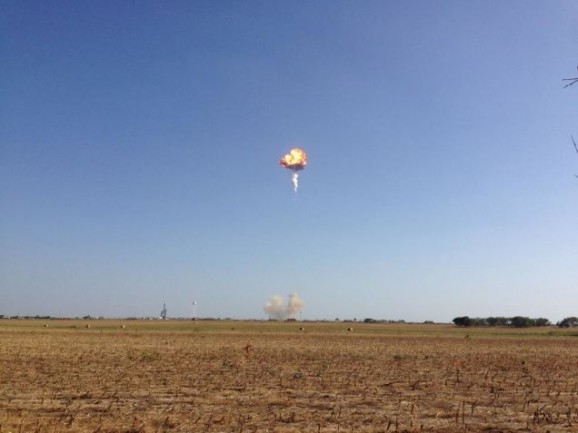SpaceX F9R Test Rocket Self-Detonates In Mid Flight
This article is more than 2 years old
 It’s hard to watch anything in the sky explode and not think: holy shit, what a disaster! But when a SpaceX Falcon 9 Reusable (F9R) test rocket exploded over Texas yesterday, it wasn’t really a disaster. For starters, no one was inside, and secondly, self-detonation is what such crafts do when they realize there’s been some kind of technical glitch or error. So on the one hand, the safety measure worked; on the other, it’s never really an awesome thing for a test rocket to have an error that prompts it to self-detonate.
It’s hard to watch anything in the sky explode and not think: holy shit, what a disaster! But when a SpaceX Falcon 9 Reusable (F9R) test rocket exploded over Texas yesterday, it wasn’t really a disaster. For starters, no one was inside, and secondly, self-detonation is what such crafts do when they realize there’s been some kind of technical glitch or error. So on the one hand, the safety measure worked; on the other, it’s never really an awesome thing for a test rocket to have an error that prompts it to self-detonate.
Space X's rocket falling out of the sky in pieces!! pic.twitter.com/Kf1rS12WNR
— Heath Huffman (@huffman_heath) August 22, 2014
The F9R is a successor to SpaceX’s impressive Grasshopper rocket. Earlier iterations of the rocket have been successfully launched and have even helped put satellites into orbit and bring cargo to the International Space Station. Yesterday’s test was of a three-engine version of the rocket, which is a new prototype the company is working on. SpaceX isn’t sure or isn’t saying (or both) what went wrong. In an official statement released after the explosion, they said, “an anomaly was detected in the vehicle and the flight termination system automatically terminated the mission.” In other words, something went wrong and our rocket decided to blow itself up. The good news is that despite the malfunction, the rocket “remained in the designated flight area” and no injuries were reported.
Three engine F9R Dev1 vehicle auto-terminated during test flight. No injuries or near injuries. Rockets are tricky …
— Elon Musk (@elonmusk) August 23, 2014
SpaceX is taking the setback in stride. After all, what are test flights for if not to identify “vehicle anomalies”? The statement also indicated that the test was “particularly complex, pushing the limits of the vehicle further than any previous test.” A team of engineers from the company will analyze the flight records and other data, and will release an update with the official cause of the anomaly once they’ve figured it out.
Given the Falcon 9’s positive record thus far, I’d say this probably isn’t much of a hiccup. Any space-related explosion is going to cause an immediate association with the Challenge and Columbia disasters, but the point here is that they caught a problem with the rocket long before that could happen, ultimately making their vehicle and space travel safer—we can’t get to Mars without breaking a few rockets along the way, right? A Falcon 9 launch in which the rocket will bring an AsiaSat 6 satellite into orbit remains scheduled for Tuesday.












